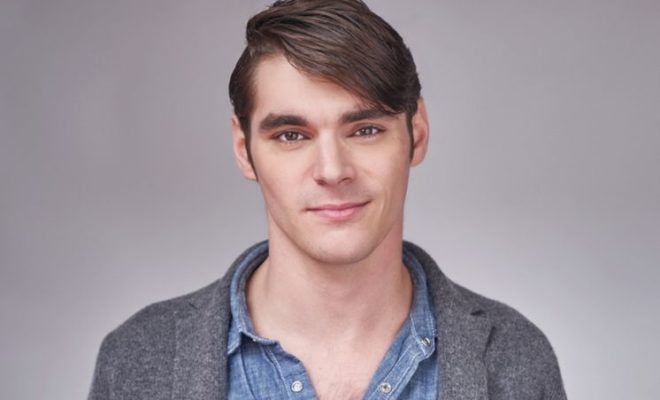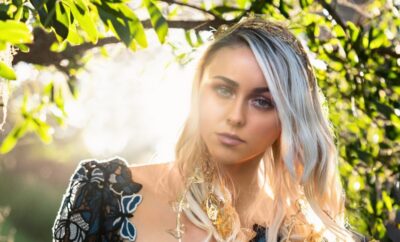
Interviews
RJ Mitte – Carol of the Bells
By: Kelly Kearney
Q) You play Scott Johnson, a stressed family man with a difficult past in Carol of the Bells. How was Scott originally described to you?
A) A stressed out, kind of a Grinch type guy yet he is a good dad, good husband but does not feel like he is any of those things. He has a lot of animosity towards his biological family and hates himself for what he thinks he’s done in his life. If you have uncertainty about who you are as an individual that can really hurt your family, this character really wanted to better himself and find answers to find out who he is and what he represents.
Q) What was the audition process for this role like?
A) I’m a big advocate for anti-bullying and advocacy is a big part of my life. Finding ways to provide people with opportunities, combating the stigmas of how people perceive individuals – not just people with disabilities but for people from all walks of life. Joey [Travolta] and I have worked together for some time now and discussed doing a project together. So, when he reached out to me and said, “Hey, I want you to be this guy. I want you to play Scott, will you read the script and consider it?” I read it and I loved it. I loved what we were trying to create from that point. It was important to me, as well as this project, is not just a great story we’re telling. We also used a 70% disabled cast and crew to create this feature film in a very short amount of time. The reality of it was we had about two weeks to shoot this film.
Q) What was it about this script that made you want to sign on to this project?
A) There is a stigma about disability, that if you have a disability you are a liability, that you can’t possibly compete with the professionals, that you do not have that ability to pull it off and I really believe that isn’t true. It’s an inaccurate perception and we need to show more projects that highlight the capabilities of people with disabilities. Not just in front of a screen but behind the camera as well; there are individuals with disabilities that have raw talent in these areas that needs to be cultivated and that’s what inclusive media is about. Breaking the barriers, removing the stigmas were a big reason for me, not just for this film but the industry in general. I’m also adopted and have no idea who my biological family is, so this unique take on that choice families make really resonated with me.
Q) What advice did director Joey Travolta offer that you took to heart while filming?
A) Most important, as he is coming to terms with his past, the character blames his biological parents and his whole view changes to where he could no longer blame his real mother. It was his lack of understanding of the world and also lack of willing to learn. The way we saw it, there are things you can run into or run from it. I’m a “run into it” kind of person.
Q) The story about a man coming to terms with his adoption and the reality of the struggles his disabled biological mother is in, is a story that is so new but needed to be told. How important is representation to the disabled community and to the world as a whole?
A) I think its highly important. I think it’s a message that needs to get out and this is one of many that needed to be told. There is a lot of lack of understanding when it comes to disability and there’s lack of willingness to not just fall by the wayside and not just hide from it but also embrace it. I grew up as the person who took care of my grandparents and my parents, as we all at one point in our lives will need assistance.
Q) Talk a little bit about Inclusion Films, the producers of Carol of the Bells and their goal to provide roles for disabled actors.
A) It’s not just disabled characters, it’s individuals with disabilities with lighting or cinematography and grips and electric. Well more than half our crew were disabled and there is an unsaid idea that this means we are slower or whatever those stigmas are, the stigma is there. I don’t have to talk about them because they are there, we already know that the stigma exists. The name “disability” itself says that.
There is an overall lack of understanding for what people go through and that does not make them any less employable. It makes them more employable. To me, disability is sometimes seen as a weakness or an illness – something that needs to be cured or removed or stopped. For me, I disagree with that. I think we need to embrace our disabilities and utilize them, highlight them so we can understand where we come from as individual people as species as human beings.
Especially in this world we live in now, sometimes we forget that we are all going to get sick one day. We are all going to need someone there. You can either make it a bad thing or a positive and to me this is knowledge and knowledge is power.
Q) The majority of the roles in this film went to actors with some form of disability. In your opinion, what can be casting directors and producers do to better diversify the film and television industry?
A) Be more aware of these talented actors. Don’t just stick to these mundane pigeonhole roles. Don’t stick to, “This is what we’re casting and this is all we’re casting.” Be more open to a version of a role you never thought you’d see. It may be the best one yet. We are in a place now that we are diversifying and you have seen a big influx of diversity in new roles and that’s what we did with this project. We didn’t just hire people with disabilities, we hired the best person for the job that needed opportunities that no one else would give them.
Q) Fans might not know this, but like your character, you were adopted. Was it easier to portray someone you had so much in common with? Did this story hit close to home for you?
A) Everything I do, every role I take, is all an element of who I am as an individual. I don’t take roles that don’t resonate with me for who I am because I can create something that I am not, but it’s not going to come across as believe able or genuine. For me, this was a great opportunity to show that side and who I am but yet this character and I are two vastly different people. We handle things differently, but at the end of it I was to be able to highlight a small fragment of who I am into this role and I try to do that with all my characters.
Q) Of course, I have to ask about “Breaking Bad.” What did you personally take away from your time on the series?
A) Show up on time, know your stuff and hang on for as long as you can. “Breaking Bad” was an amazing experience to have in my career as it was a one-of-a-kind show. I was actually just in New Mexico working with Deadline on “Hotspots,” a new series that they are doing that’s highlighting cities and states around the country as well as around the world that are renowned for filming. New Mexico and Albuquerque have become number one places for films and TV production and I’m a big believer that New Mexico as a setting played a big part of the success of “Breaking Bad.”
Q) Would you say Walt Jr. opened the doors for other disabled actors looking for work?
A) One of many along the road to help this door open and this is a very big door anyone can walk through it. I think Walt Jr. was one of those pivotal characters that really defined what disability should really look like in media, not as a gimmick and not some sick kid but a teenager dealing with angst and family drama and wanting to grow up like a normal teenager.
We all have a different path to life and roads we had to go down, and maybe ours is not as forgiving as most, but we’ve all had to learn something unique in it and I believe that Walt JR was a pivotal piece for this industry to see this type of character. It’s crazy looking back and thinking about how it’s been 14 years since we’ve opened that door for so many.
Q) Fans can be exuberant and passionate about that show. Have you had any memorable fan encounters since “Breaking Bad” ended?
A) I have memorable fan encounters all the time and am so blessed to have the fans that I have. They may not be huge in numbers on Twitter or Instagram, but I have a devoted following that cares about me and my content and supports my decisions and hopefully grow from it. I always want others to be encouraged by me and try to be a benchmark for others to raise up, for others to surpass me, that is ultimately what I want.
Q) Besides Carol of the Bells are you working on any other projects the fans can look out for?
A) I’m working on a movie called Isaac, shot in LA, working with the amazing Dove Cameron and great group of others. I’m super excited about it. We have shot about fifty percent. Hopefully, we are going to finish shooting in April this year. I have another movie that’s out of Australia called Standing Up For Sunny. It’s online now on iTunes, etc.
I’m also working in Texas now with my family foundation in the city of Brownsville in Austin. I am always looking for the next position or the next role to elevate me, finding new things to be passionate about and surmount new obstacles and find new heights.
Q) What would you like to say to everyone who are fans and supporters of you and the work you do?
A) Just a really big thank you! I couldn’t do it if it wasn’t for them and I wouldn’t be able to work or succeed without them. You need support to grow in this business and I’m lucky to have such a devoted audience as they help keep me relevant with their unconditional support.




You must be logged in to post a comment Login